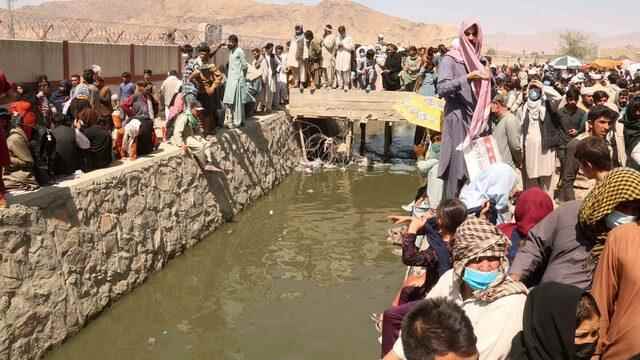A retired Foreign Ministry official in the UK described the chaos in the ministry during the evacuations accelerated by the Taliban’s entry into Kabul.
Raphael Marshall explained that during the evacuations dominated by chaos, the decisions about who can get on the plane from Kabul were made “arbitrarily” and that the e-mails of many people who listed their reasons were not read.
He stated that then Foreign Minister Dominic Raab, who resigned from his post, was also very slow in making decisions. A ministry spokesman said ministry officials “work tirelessly”.
A source close to Raab said that the main problem is verifying identities and ensuring safe passage; He said he didn’t have to make a quick decision.
Britain evacuated 15,000 people from the country after the Taliban entered the capital, Kabul, before the US withdrawal from Afghanistan ended. About 5,000 of them were British citizens, 8,000 were Afghans, and 2,000 were children.
Marshall, who gave a written statement to the Foreign Relations Committee, stated that 150,000 Afghans are at risk due to their links with the UK and that all of them should be evacuated; however, less than five percent stated that they were able to receive support in this regard:
“It is clear that some of these people who were left behind were killed by the Taliban.”
Marshall, who worked as a senior officer at the Ministry until he resigned in September, stated that the unit he worked for had an “insufficient staff” at the crisis desk, and that it was insufficient in terms of expertise and coordination with the Ministry of Defense.
Marshall also said that Raab responded to his emails hours later and “didn’t fully understand the situation”.
Former diplomat Marshall’s allegations are listed as follows:
- 5 percent of the 150 thousand people who asked for help were helped.
- There was no one in the team dealing with aid requests who had been trained in Afghanistan, had detailed knowledge of the country, or had worked there.
- No one from the team knew the languages spoken in Afghanistan, only those who spoke English could be contacted
- Decisions about who to evacuate were made arbitrarily and thousands of emails asking for help went unread
- IT systems were not functional, eight soldiers brought in to assist in this matter were given a single computer and they had to work by sharing this computer.
- Dominic Raab was particularly slow to make difficult decisions and did not fully understand the situation.
The government chart, created as the Taliban approached Kabul in August 2021, included a list of Afghans working directly with the British government and information on how to identify those at risk due to their ties to the UK.
Marshall was also working with the team of officials dealing with the so-called “Afghan Special Cases” group. Among them were Afghan soldiers, politicians, journalists, civil servants, activists, aid workers, judges and security guards working directly for Britain by contracting with the British government.
However, employees in the crisis center could not connect to the network of ministry computers because the systems were not yet integrated. For this reason, computer experts were called to duty, but many mistakes were made because they had not used this system before.
Some of them were not opened because the passwords of the computers could not be provided. At one point, eight soldiers had to share a computer.
Telephone conversations with Afghans could only be made in English because there was no one on the team who could speak Pashto or other Afghan languages. There was no one who had detailed information about Afghanistan or had seen it.
“One person on the team was frankly horrified at making a life-or-death decision for hundreds of people whom he knew nothing about. Many people in the crisis center did not really grasp the real situation at Kabul Airport and the necessity to make an emergency call,” Marshall said. he explained the situation.
In such an environment, Marshall stated that he expected him to contribute to the decision-making process by sending notes and e-mails to Raab about the files that the team had difficulty with, and said, “However, it took hours for him to respond.”
He also said that Raab refrains from making a decision on whether to accept people who do not fill out the application form properly because they do not have enough time.
A source close to Raab said that over 500 people with special circumstances had been evacuated.
A spokesperson from the British government said that after the mass evacuations at that time ended, they continued to work for evacuations to the UK and helped 3,000 more people leave Afghanistan:
“Unfortunately, we couldn’t evacuate everyone we wanted, but our promise to them still stands.”
